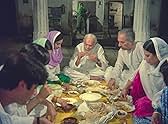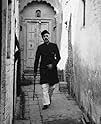In post-partition India, a Muslim businessman and his family struggle for their rights in a country which was once their own.In post-partition India, a Muslim businessman and his family struggle for their rights in a country which was once their own.In post-partition India, a Muslim businessman and his family struggle for their rights in a country which was once their own.
- Awards
- 4 wins & 4 nominations total
- Director
- Writers
- All cast & crew
- Production, box office & more at IMDbPro
8.0910
1
2
3
4
5
6
7
8
9
10
Featured reviews
Garm Hawa
This film showcases great acting performances. Balraj Sahani, Geetha, and Shaukat Azmi play extremely complicated characters with great skill and poise. Of course a film like this would never be nominated for Oscars or any other major prize because it would be considered an off beat film. Nevertheless, the film portrays the political and cultural changes that affected innumerable common people right after the partition of India and Pakistan. I would definitely recommend this film to everyone. If you are looking for spontaneous acting that moves you and makes you want to revisit that historical era, this is the movie to go for!
one of the best movies ever made
I saw this movie many years ago...and although so many years have passed this movie still remains etched in my mind.It was MS Sathyu's debut film as director. But he has till date not made a better film. To say that Garam Hawa is one of the most poignant and moving films ever made on the Partition is merely stating the obvious. Directors like Ritwick Ghatak had also earlier dealt with the Partition of Bengal. But Garam Hawa, made in 1973, marked the first time that a Hindi film director had handled the subject with so much sensitivity and realism.
I went to the market to purchase a DVD copy. But alas!!..It was not available in the Indian market. It is such a sad situation that being a Indian movie it is not available in India!!!...if anyone who reads this and has any knowledge as to the address where i can buy a copy IN India please email me at the foll address vinamra88@yahoo.com.I shall be ever grateful.
I went to the market to purchase a DVD copy. But alas!!..It was not available in the Indian market. It is such a sad situation that being a Indian movie it is not available in India!!!...if anyone who reads this and has any knowledge as to the address where i can buy a copy IN India please email me at the foll address vinamra88@yahoo.com.I shall be ever grateful.
This is part of our (Indian) history
All those involved with this movie have done a service to Indian people, who are interested in history, partition, Hindu-Muslim relations etc. It does not matter whether this movie was declared hit, semi-hit or average, but it has left an incredible mark on one's psyche. It moves oneself to see those Muslim people who chose to stay behind in India, with their plight and dilemma. It definitely plays a big role to arouse sympathy and a soft corner for Muslim brethren who chose to stay in India, despite all the odds against them. All those associated with the story like Ismat Chugtai, Kaifi Azmi & Shama Zaidi have given an unbiased portrayal of that time. The story seemed to be too real. One loves to see the Muslim family in the movie sitting together and having their meals, where everybody participates in the discussion of the circumstances. Like the story, acting was natural all across the board, the only regret being, one expected some memorable songs, at least one or two, which were not there. Music is like dessert to an Asian mind, which adds to the lasting taste of the meal. With good music, this movie might have been declared a commercial hit too.
10anilkfan
Sensational stuff by the talented M.S.Sathyu and evergreen Balraj Sahni.
The DVD cover of this film says "Most memorable movie of Balraj Sahni"...well guess what, not just the most memorable movie of Balraj Sahni...but probably one of the greatest of the great movies ever seen in in Indian film industry and a landmark performance in the history of Indian cinema.
The best movie on the India-Pak partition. The movie based in Agra deals with the social issues amongst other issues related to the partition and the repercussions of the partition on the society in general and looking at the problems within one family, both internal and external!
The features and expressions of Balraj Sahni and his portrayal of Salim Mirza is too good to be true! Words cant describe his performance! It is said that Dilip Kumar was first offered this role. Good support from Farooq S, AK Hangal, Gita Siddharth and many others!
Great Script by Kaifi Azmi and sensational stuff by the director M.S.Sathyu. Exceptionally realistic, hard hitting and a bonafide classic! 10 out of 10!
The best movie on the India-Pak partition. The movie based in Agra deals with the social issues amongst other issues related to the partition and the repercussions of the partition on the society in general and looking at the problems within one family, both internal and external!
The features and expressions of Balraj Sahni and his portrayal of Salim Mirza is too good to be true! Words cant describe his performance! It is said that Dilip Kumar was first offered this role. Good support from Farooq S, AK Hangal, Gita Siddharth and many others!
Great Script by Kaifi Azmi and sensational stuff by the director M.S.Sathyu. Exceptionally realistic, hard hitting and a bonafide classic! 10 out of 10!
A film created with the wrong intent and misguiding message
The film continues the thread throughout that post independence any Muslim who migrated to Pakistan had an easy, successful life. The subtle barbs are unmissable when they show that anyone moving out of the country with contempt are proven right, and even those who reluctantly moved, did well after settling in Pakistan ( got scholarship to Canada, and lots of orders from the army etc). And those staying back lose their homes, businesses, even their children are jobless and get cheated and commit suicide.
Whate is the intent of such a film than misguiding the Muslim youth our countrymen to feel a regret, and as if a missed opportunity. To feel alienated and having to fight for an equal treatment. The film ends in that note to complete its tale of woe.
A completely wrong message and to hail such films as landmark and must-watch is to only rub salt on the wounds of those who want our countrymen to feel wronged and disloyal.
The film itself has great performances, good editing and direction, hence I rate it a 6 on IMDB.
Did you know
- TriviaBalraj Sahni passed away just after finishing the dubbing of the film. His own daughter had died at a young age and there is a touching scene in the film where Salim Mirza's daughter commits suicide. His expressions are as real as they can be, in the scene when he finds her dead and in the next scene, is at her funeral. It was one of his best performances and his presence added a lot of class, grace and lifted the film to great heights. The effort and passion of the unit was rewarded by having him as the lead actor.
- ConnectionsFeatured in Mammo (1994)
- How long is Garm Hava?Powered by Alexa
Details
- Release date
- Country of origin
- Languages
- Also known as
- Горячие ветра
- Filming locations
- Agra, Uttar Pradesh, India(Mirza family's residential city)
- Production companies
- See more company credits at IMDbPro
Contribute to this page
Suggest an edit or add missing content

























